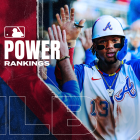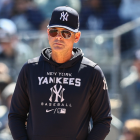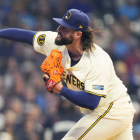I've been watching baseball for a long, long time, but I've never seen a game end like this. The Cardinals walked off with a 5-4 win in Game 3 of the World Series on Saturday night, which isn't all that crazy in and of itself. It's how they walked off. Here's the play:
Third base umpire Jim Joyce called obstruction on Red Sox third baseman Will Middlebrooks, who interfered with Allen Craig when he broke home on Jarrod Saltalamacchia's poor throw into left field. It's the right call. You don't see it very often, but it's the right call. Two important things:
- Middlebrooks' intent is irrelevant according to rulebook. It doesn't appear he intentionally got in Craig's way, but that doesn't matter. Once he gets in the way, it's obstruction.
- The obstruction call is made only if Craig continues running. If he stops and retreats to third base, the obstruction goes away.
Obstruction, according to the rulebook, is "the act of a fielder who, while not in possession of the ball and not in the act of fielding the ball, impedes the progress of any runner." It's clear that's what happened at third base, but it's not something you see called very often.
For sake of reference, here's the full text of the rule in question:
7.06 When obstruction occurs, the umpire shall call or signal “Obstruction.”
(a) If a play is being made on the obstructed runner, or if the batter-runner is obstructed before he touches first base, the ball is dead and all runners shall advance, without liability to be put out, to the bases they would have reached, in the umpire’s judgment, if there had been no obstruction. The obstructed runner shall be awarded at least one base beyond the base he had last legally touched before the obstruction.
Any preceding runners, forced to advance by the award of bases as the penalty for obstruction, shall advance without liability to be put out.
Rule 7.06(a) Comment: When a play is being made on an obstructed runner, the umpire shall signal obstruction in the same manner that he calls “Time,” with both hands overhead. The ball is immediately dead when this signal is given; however, should a thrown ball be in flight before the obstruction is called by the umpire, the runners are to be awarded such bases on wild throws as they would have been awarded had not obstruction occurred. On a play where a runner was trapped between second and third and obstructed by the third baseman going into third base while the throw is in flight from the shortstop, if such throw goes into the dugout the obstructed runner is to be awarded home base. Any other runners on base in this situation would also be awarded two bases from the base they last legally touched before obstruction was called.
(b) If no play is being made on the obstructed runner, the play shall proceed until no further action is possible. The umpire shall then call “Time” and impose such penalties, if any, as in his judgment will nullify the act of obstruction.
Rule 7.06(b) Comment: Under 7.06(b) when the ball is not dead on obstruction and an obstructed runner advances beyond the base which, in the umpire’s judgment, he would have been awarded because of being obstructed, he does so at his own peril and may be tagged out. This is a judgment call.
NOTE: The catcher, without the ball in his possession, has no right to block the pathway of the runner attempting to score. The base line belongs to the runner and the catcher should be there only when he is fielding a ball or when he already has the ball in his hand.
And the relevant defition from Rule 2.00. Note that the concluding example describes the play above almost perfectly ...
OBSTRUCTION is the act of a fielder who, while not in possession of the ball and not in the act of fielding the ball, impedes the progress of any runner.
Rule 2.00 (Obstruction) Comment: If a fielder is about to receive a thrown ball and if the ball is in flight directly toward and near enough to the fielder so he must occupy his position to receive the ball he may be considered “in the act of fielding a ball.” It is entirely up to the judgment of the umpire as to whether a fielder is in the act of fielding a ball. After a fielder has made an attempt to field a ball and missed, he can no longer be in the “act of fielding” the ball. For example: an infielder dives at a ground ball and the ball passes him and he continues to lie on the ground and delays the progress of the runner, he very likely has obstructed the runner.
What a crazy, crazy way to end a World Series game. Baseball is so much fun.
Note: Lost in the chaos is a truly great play by Dustin Pedroia on Jon Jay's ground ball to get the first out at home. Daniel Nava also made a nice play to retrieve the ball and throw to home.





















